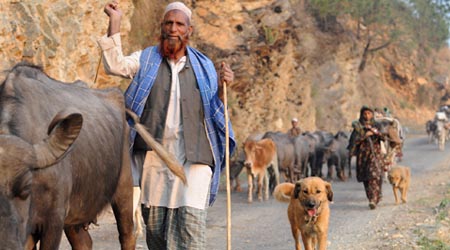
When the 2006 FRA was passed the Van Gujjars and SOPHIA decided to employ the Act to obtain the community’s forest rights. Subsequently, SOPHIA also began to work with sedentary village communities, who share the forests with the Van Gujjars. The aim of the work is to ensure forest dwellers’ lasting use, access and management of the forests by employing government channels.

The Van Gujjars claim forest rights as individual families because their 1937 permits, and minimal forest rights, have been issued thus. The work towards forest rights commenced by surveying the population and communally mapping the areas of occupancy. Furthermore, it was ensured that Van Gujjars hold seats on the Forest Rights Committee. Due to the Van Gujjars’ orality, compiling the evidence for their claims was challenging. The principle evidence used was families’ forest permits and colonial letters, which demonstrate the Van Gujjars’ longstanding occupancy of the forest. Additionally, the partners networked with government officials and used the media to lobby for their forest rights and to raise awareness.
.jpg)
.jpg)

The Van Gujjars’ understanding of the FRA has empowered the community to assert their presence in the forest and to resist forest officials’ bribes. In the state of Uttar Pradesh, 2,250 Van Gujjars’ claims have been filed as of 2014, and the process of settlement will follow. In Uttarakhand, 1,600 claims have been prepared for submission, but the filing of the claims by the government is yet to be initiated. Whilst these are positive steps forward, the government is very slow in responding to claims that have been issued. Furthermore, many Van Gujjars continue to face challenges with regard to their use of and access to conserved forests.